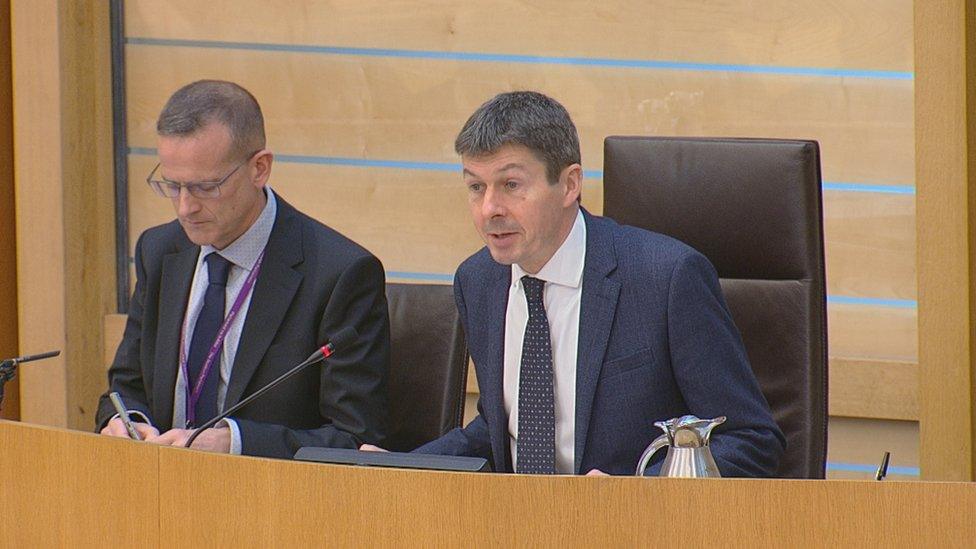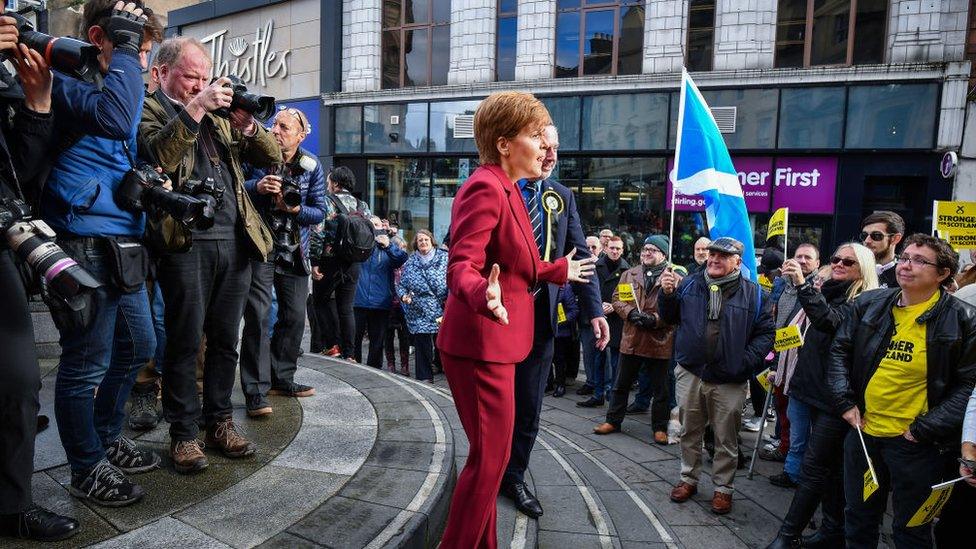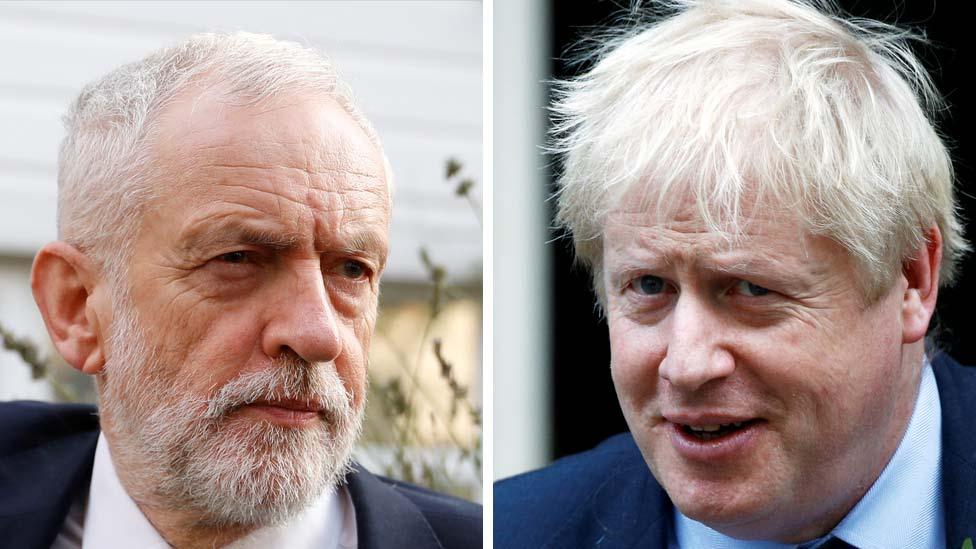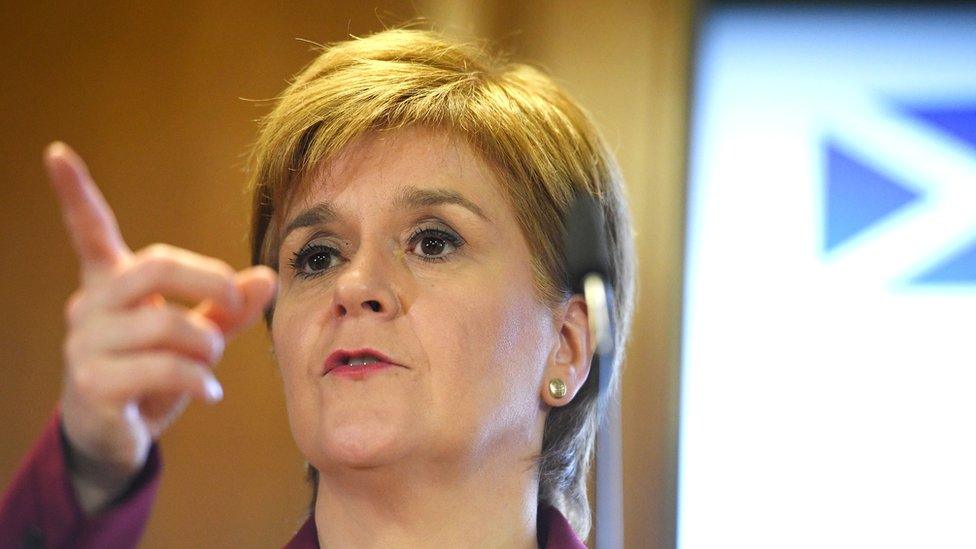Election fever strikes Scottish politics
- Published

It's going to be a long six weeks for Ken Macintosh
There was Mike Russell at Holyrood, valiantly pursuing his ministerial duty of keeping Scotland informed. According to the Minister for Mitigating Brexit, new official figures suggest the PM's latest deal for leaving the EU will impoverish Scots.
Unaccountably, some on opposition benches seemed to feel there was a partisan edge to Mr Russell's comments. Murdo Fraser of the Tories was particularly exercised.
As the chamber demonstrated signs of election fever - OK, more signs - the Presiding Officer Ken Macintosh appealed for calm from all sides. In particular, he urged, if MSPs must indulge in electioneering, try not to make it too blatant.
Loadsaluck with that one, PO. Loadsaluck.
For this is the Christmas election with an icy bite. The Brexit election. The independence election.
At Westminster, the leaders kept it blunt and simple. Boris Johnson said it was about leadership, a stark choice between economic catastrophe under Labour and a glorious future under his new deal.
And the PM went further, suggesting that Labour would be prepared to endorse two more referendums. One on Europe. One on Scotland. In those few words, the kernel of the Tory pitch.
Labour's Jeremy Corbyn also felt the choice "couldn't be clearer". But, of course, he framed it in rather different terms. It was Labour "real change" versus the "sell-out" of the NHS in a "Trump trade deal" with America. Mr Johnson dismissed this as nonsense.
For the SNP, Ian Blackford also got down to serious business. Scotland, he said, hadn't voted for Brexit - and would see this election as an "escape route", paving the way to an independence referendum.
Jo Swinson of the Liberal Democrats had to wait a long time to be called by the retiring Speaker. When she was, she argued for another chance to be heard - in televised leaders' debates. Voters, she said, were tired of the "two old parties". One presumes she meant Conservative and Labour.

Nicola Sturgeon wasted no time in getting to a SNP target seat in Stirling
Back to Scotland and the campaign trail. Nicola Sturgeon was in Stirling, stressing that independence was front and centre in her thinking.
This was her syllogism. Brexit is in chaos. That demonstrates that Westminster is broken. That requires a Scottish rescue. That requires independence. QED.
The emphasis is not surprising: it is the long-standing SNP dream. To be clear, they are against Brexit. They would seek to thwart it by any means feasible, including a second referendum.
But the stress for this election is more precisely upon deploying independence as the method of reversing Brexit.
And the Tories? They want to claim the title of chief opponents of independence.
Jackson Carlaw was on the streets in Perth. He acknowledges that most people in Scotland backed Remain in the Brexit referendum - but seeks to move on from that by arguing that the PM can get the issue over and done with, hoping that will appeal to all sides.
Again, it's a question of emphasis. Naturally, in Remain-voting Scotland, he lays relatively little stress on Brexit, other than to appeal for its closure.
Rather, he signals a renewed determination to block independence, arguing that Labour is weak on the subject of indyref2.

Scottish Tory canvassers are already out in force
The Tories discerned some ammunition for that claim today when Andy McDonald, a Labour shadow cabinet member, said on the BBC's Politics Live that his party didn't want indyref2 but would not stand in the way of it.
Cue outrage from other advocates of union. Challenged on the issue in Leith, Scottish Labour leader Richard Leonard said the conditions did not exist at this time for a second independence referendum.
Mr Leonard argued that the true purpose of this election was not to replicate or rerun either referendum. It was to remove Boris Johnson from Number 10, thus enabling Labour's "radical" programme of economic and social reform.
But Mr Leonard - who is a highly astute politician - knows he will continue to be pursued over indyref2. And over the fact that Mr Corbyn backs a second Brexit poll - while Scottish Labour goes further and advocates Remain.
The Liberal Democrats held strategy talks in Edinburgh. Again, a simple task in this most polarising of elections.
The LibDems say: block Brexit. By a second referendum or, if they sweep to majority Westminster power, by revoking Brexit.
And thwart independence. That, they say, is a distinctive dual pitch in line with Scottish thinking. And they argue that their new federal leader Jo Swinson offers a fresh outlook.
Anyway, fancy a 50p coin, marked with the previously scheduled Brexit departure date, October 31? Too late. They are to be melted down. O tempora, o mores.
- Published30 October 2019

- Published29 October 2019

